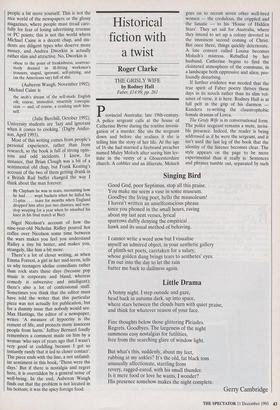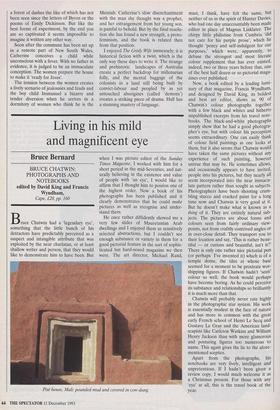Historical fiction with a twist
Roger Clarke
THE GRISLY WIFE by Rodney Hall Faber, £14.99, pp. 261 Provincial Australia; late 19th-century. A police sergeant calls at the house of Catherine Byrne during the routine investi- gation of a murder. She sits the sergeant down and before she realises it she is telling him the story of her life. At the age of 16 she had married a firebrand preacher named Muley Moloch after seeing him lev- itate in the vestry of a Gloucestershire church. A cobbler and an illiterate, Moloch
goes on to recruit seven other well-bred women — the credulous, the crippled and the fanatic — to his 'House of Hidden Stars'. They set sail for Australia, where they intend to set up a colony devoted to the imminent second corning of Christ. But once there, things quickly deteriorate. A late convert called Louisa becomes Moloch's mistress. Rebuffed by her husband, Catherine begins to find the cloistered atmosphere of the commune, in a landscape both oppressive and alien, pro- foundly disturbing.
If further evidence was needed that the true spirit of Faber poetry thrives these days in its novels rather than its slim vol- umes of verse, it is here. Rodney Hall is at full pelt in the grip of his daemon — Kundera re-writing the claustrophobic female dramas of Lorca.
The Grisly Wife is in conversational form. The police sergeant remains a mute, invisi- ble presence. Indeed, the reader is being addressed as if he were the sergeant, and it isn't until the last leg of the book that the identity of the listener becomes clear. The style appears on the page to be more experimental than it really is. Sentences and phrases tumble out, separated by such
a forest of dashes the like of which has not been seen since the letters of Byron or the poems of Emily Dickinson. But like the best forms of experiment, by the end you are so captivated it seems impossible to imagine it written any other way.
Soon after the commune has been set up in a remote part of New South Wales, Catherine conceives a child while unconscious with a fever. With no father in evidence, it is judged to be an immaculate conception. The women prepare the house to make it 'ready for Jesus'.
The tension between the women creates a lively scenario of jealousies and feuds and the boy child Immanuel a bizarre and tender diversion when he arrives in a dormitory of women who think he is the Messiah. Catherine's slow disenchantment with the man she thought was a prophet, and her estrangement from her young son, is painful to behold. But by the final resolu- tion she has found a new strength, a proto- feminism, and the book is related then from that position.
I enjoyed The Grisly Wife immensely; it is historical fiction with a twist, which is the only way these days to write it. The strange and prehistoric landscapes of Australia create a perfect backdrop for millenarian folly, and the mental baggage of the colonists in a land still being built by convict-labour and peopled by as yet untouched aborigines (called 'demons') creates a striking piece of drama. Hall has a stunning mastery of language.



































































 Previous page
Previous page